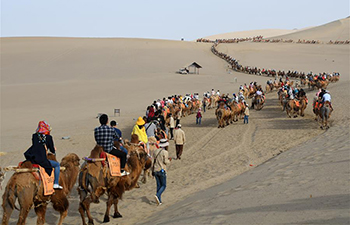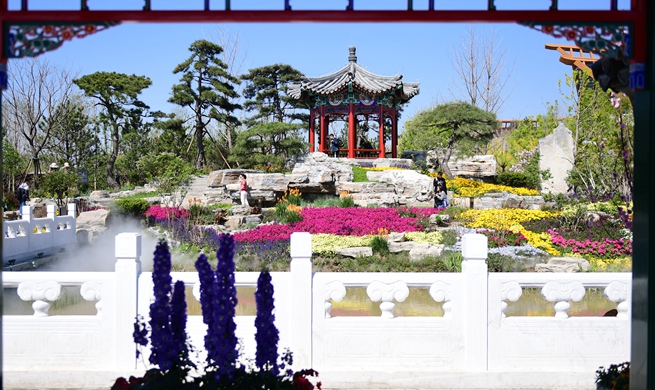NAIROBI, May 2 (Xinhua) -- Joseph Irungu, a dairy farmer in Kiambu County, planted brachiaria grass as soon as the rains started in Kenya two weeks ago after a lengthy delay.
The farmer, as many others across the east African nation, planted urgently, having been warned by the Meteorological Department that the rains may not last long.
Since then, the rains have been intermittent but Irungu is not worried since his fodder has germinated, and by the time the downpour stops, he would be assured of an adequate supply of fodder this season.
Initially, Irungu, who also grows crops, planted maize and beans on more than half of his three acres of land during the March-May rainy season, but this time around, he changed tact after advice from an extension officer.
The officer asked farmers to plant fodder on large-scale or any fast-maturing crops that are harvested in three months to maximize on the stifled rains, rather than maize, which goes for up to seven months.
"I planted the fodder on two-and-half acres and half-acre some vegetables. For the next months, my animals are not only assured of feeds, but I also have something to sell to other farmers and make money," Irungu said. "But more importantly, I would not suffer any crop failure because I avoided maize."
He is one of the Kenyan farmers who have embraced climate-smart farming practices to cope with scarce rains.
Agricultural experts note that Kenyan farmers have no choice but to immediately take up climate-smart practices to save themselves from the vagaries of unpredictable weather.
"The use of climate-smart practices have in the past been limited to mainly large-scale farmers as small ones continue to use traditional farming methods but this is no longer feasible because of the erratic weather," said Joseph Muhwanga, a manager with Climate-Smart Agriculture - East Africa, at a recent workshop.
Among climate-smart practices the organization is teaching farmers is the growing of drought-resistant fodder like brachiaria and the making of silage to feed animals during dry spells.
To make silage, the grass is harvested when about a meter-high, slashed into small pieces and then compressed in a bunker as it is mixed with molasses, Peter Oduor, an animal health specialist from Egerton University, explains. The fodder can stay for up to two years, saving farmers from drought.
John Recha, a climate-smart expert with Consultative Group for International Agricultural Research, says most small farmers in Kenya need training on smarter and innovative farming practices to overcome the effects of climate change.
These include use of drought- and pest-tolerant seeds and irrigation. According to him, farmers are now grappling with new pests and diseases that were never seen before, due to climate change.
"Farmers must now embrace drought-resistant varieties of seeds and crops, and use environment-friendly farming practices and manage in a better way their harvest to reduce losses," Recha said.
Kitui is one of the leading counties in Kenya that is lauded for embracing climate-smart farming practices that include growing of drought-resistant crops, in particular green grams.
Hundreds of farmers in the semi-arid region are currently growing the crop that matures in about four months and is exported to countries like India, putting more money in growers' pockets, according to the county's agriculture executive, Emmanuel Kisangau.













